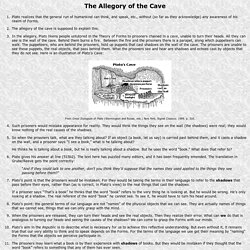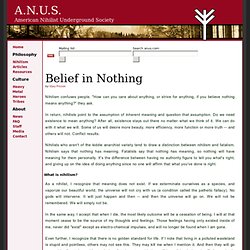

Values & Ethics. Allegory of the Cave. Plato realizes that the general run of humankind can think, and speak, etc., without (so far as they acknowledge) any awareness of his realm of Forms.

The allegory of the cave is supposed to explain this. In the allegory, Plato likens people untutored in the Theory of Forms to prisoners chained in a cave, unable to turn their heads. All they can see is the wall of the cave. Behind them burns a fire. Between the fire and the prisoners there is a parapet, along which puppeteers can walk. From Great Dialogues of Plato (Warmington and Rouse, eds.) Here are some students’ illustrations of Plato’s Cave Go back to lecture on the Phaedo Go back to lecture on the “One Over Many” Argument Go to next lecture on Criticism of Forms Need a quick review of the Theory of Forms?
Return to the PHIL 320 Home Page Copyright © 2006, S. 100 Tips About Life, People, and Happiness. Drugs and the Meaning of Life. (Photo by JB Banks) (Note 6/4/2014: I have revised this 2011 essay and added an audio version.

—SH) Everything we do is for the purpose of altering consciousness. We form friendships so that we can feel certain emotions, like love, and avoid others, like loneliness. We eat specific foods to enjoy their fleeting presence on our tongues. Drugs are another means toward this end. One of the great responsibilities we have as a society is to educate ourselves, along with the next generation, about which substances are worth ingesting and for what purpose and which are not.
However, we should not be too quick to feel nostalgia for the counterculture of the 1960s. Drug abuse and addiction are real problems, of course, the remedy for which is education and medical treatment, not incarceration. I discuss issues of drug policy in some detail in my first book, The End of Faith, and my thinking on the subject has not changed. I have two daughters who will one day take drugs.
(Pokhara, Nepal) Ott, J. Squashed Philosophers- Condensed Plato Aristotle Augustine Descartes Hume Marx Freud Copernicus Hobbes Sartre Ayer Sade Wittgenstein Einstein. Belief in Nothing. Nihilism confuses people.

"How can you care about anything, or strive for anything, if you believe nothing means anything? " they ask. In return, nihilists point to the assumption of inherent meaning and question that assumption. Do we need existence to mean anything? After all, existence stays out there no matter what we think of it. Nihilists who aren't of the kiddie anarchist variety tend to draw a distinction between nihilism and fatalism. What is nihilism? As a nihilist, I recognize that meaning does not exist. In the same way, I accept that when I die, the most likely outcome will be a cessation of being.
Even further, I recognize that there is no golden standard for life. A tree falling in a forest unobserved makes a sound. Many people "feel" marginalized when they think of this. Meaning is the human attempt to mold the world in our own image. This distanced mentality further affirms our tendency to find the world alienating to our consciousness. Nihilism reverses this process. Alan Watts discusses Nothing - StumbleUpon. Where Science and Buddhism Meet PART 1. Alan Watts ☮ The Way of Waking Up. 100 Facts. Philosophy. Philosophy since the Enlightenment, by Roger Jones.
Rationally Speaking.